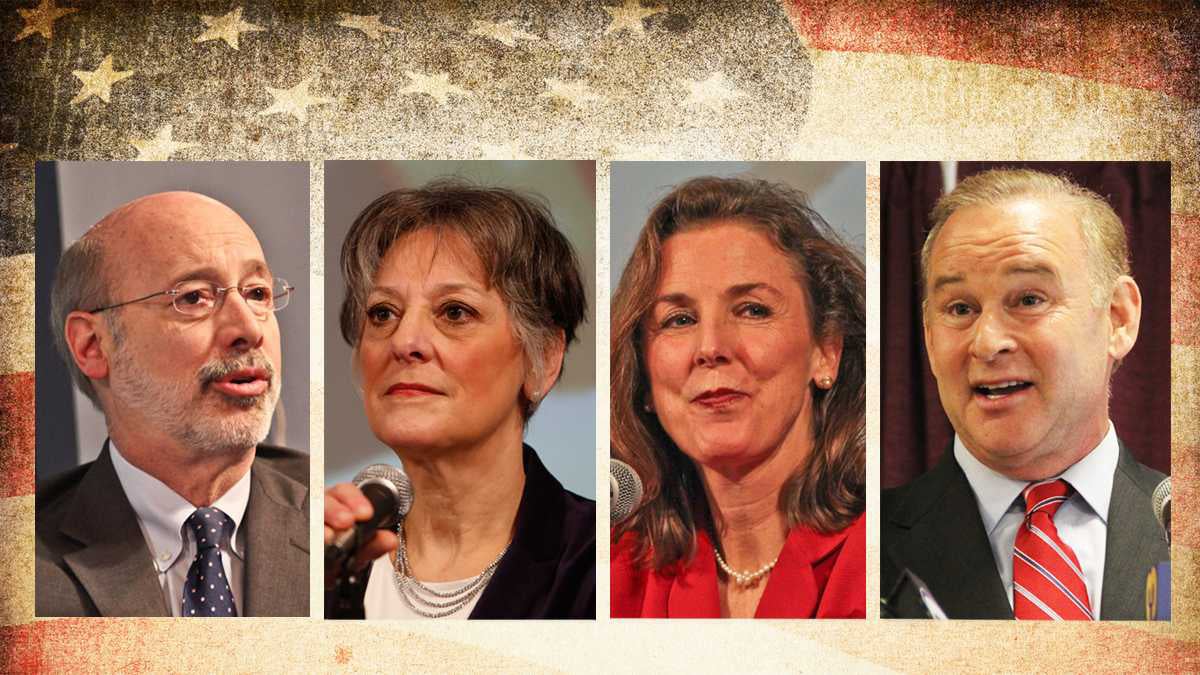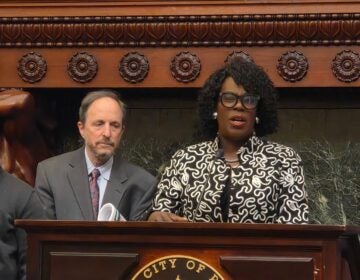Gubernatorial hopefuls break silence on Pennsylvania’s struggling cities
Listen
Democratic candidates running for Pennsylvania governor from left to right: Tom Wolf, Allyson Schwartz, Katie McGinty, and Rob McCord.
Gubernatorial hopefuls have largely ignored an issue that affects an estimated 40 percent of Pennsylvanians.
Manifested in blighted buildings, sunken streets and skeletal public safety staffing, municipal financial distress greatly impacts voters’ lives.
Even in the absence of visible evidence, susceptibility grows with pressures on struggling local governments.
Pennsylvania’s distressed communities include the urban centers of Philadelphia and Pittsburgh, smaller cities such as debt-strapped, high-poverty Harrisburg and redevelopment model Lancaster, as well as more remote areas like Shamokin and Centralia.
More than two dozen municipalities are engaged in the Act 47 process, named for Pennsylvania’s law that guides state-led recovery for distressed communities, and its precursor Early Intervention Program.
And another 80 or so communities across the commonwealth are considered distressed, but haven’t sought assistance.
Yet neither the Democratic candidates gunning to be Pennsylvania’s next governor nor Republican incumbent Tom Corbett are talking about how they’d change state laws and policies currently limiting how city and municipal governments can adjust for declining tax and population bases in the face of rising costs for debt repayments, payroll, and local pensions.
Such issues largely have gone unmentioned during the primary campaign in favor of discussions about others such as job creation, economic growth and retirement benefits for state and public school employees.
“Part of a campaign is just finding the cut-through issues, things that when people hear them, they automatically understand what you’re talking about,” said Pennsylvania Treasurer Rob McCord, one of four candidates vying for the Democratic nomination. “The technical issues surrounding Act 47 can be a little alienating.”
As a result, McCord and his opponents have favored stand-by topics more likely to capture voters’ attention rather than focus on dry, complex matters affecting the finances of cities and municipalities across the state.
“It’s not an issue that is top of mind to the voters,” said political analyst Terry Madonna of Franklin and Marshall College in Lancaster. “Economic development, jobs, Medicaid expansion – these are the programs the voters really care about.”
Voters also might not know all of the issues underlying some of their most pressing concerns and other problems that are more obviously the responsibility of their elected officials.
“The issue that people talk to me about in Pennsylvania, many of them, is that they feel they’re struggling, they’re financially struggling and they don’t have a plan or an ability to move forward,” Congresswoman Allyson Schwartz said. “They’re not necessarily asking about it in terms of a specific act or law.”
Once he or she is officially is Corbett’s opponent, the successful Democrat should expect to take up the issue.
Corbett’s administration counts Harrisburg’s $600 million debt fix, for example, as one of its accomplishments. He’s been silent on that and related issues recently, but his campaign spokesman Bill Pitman said that will change.
Pennsylvania’s governor also will have to deal with those matters during the next four years as more and more communities find their governments struggling to pay their bills.
“At some point, somebody should ask them what they think about it,” Madonna noted.
Favored fixes
All four Democratic candidates agree state laws need to change if struggling local governments want to recover and avoid similar problems in the future.
They differ, however, on which initiatives are top priority.
Let’s start with Act 47, Pennsylvania’s legislation for distressed municipalities’ recovery through state intervention.
It’s a voluntary process that doesn’t truly begin until the state’s Department of Community and Economic Development agrees a municipality needs help.Madonna pointws out Act 47 “doesn’t get a city any more money,” but instead affords them guidance through the development of a recovery plan.
That normally would come with consultant fees, but is provided at no cost to Act 47 municipalities.
They also often get priority consideration for some state grants.
Union contracts – a significant source of local costs and target for reformers – must adhere to Act 47 recovery plan recommendations; however recently-established caselaw siding with bargaining units has highlighted the legislation’s lack of enforcement mechanisms.
Since Act 47 was instituted in 1987, 27 communities have attempted recovery through the process, and just six have achieved it with any permanence.
It took Scranton nearly seven years to get out of Act 47 oversight the first time – and less than four years it sought intervention again in 2002.
Farrell, Mercer County, was the Act 47’s first case. Almost 17 years later, the 5,000-person city hasn’t achieved recovery.
“It’s not Act 47 that’s the problem, it’s the policies that are forcing cities into Act 47 that are the problem, and we need to get to root causes,” Democrat Tom Wolf said.The York County businessman said he’s been thinking about local governance issues for “decades.”
In his view, wide-ranging reforms are needed to policies that dictate things like planning codes and zoning ordinances, and the way the state allocates its investment dollars.But he and McCord both said they would prioritize changing the way Pennsylvania funds education.
Currently, state funding covers an average of one-third of local school districts’ costs. Wolf said he would increase the state’s share to half, and pay for it with income taxes.McCord would use a 10 percent severance tax on natural gas drillers to help fund not only education, but also environmental protection.
He and Schwartz also think the state should do more to attach incentives to best practices implementation at the local level, regardless of whether the community is declared distressed.
“If you bring resources over time, I think you can get the votes to increase efficiency in schools, and shared services, especially emergency services,” McCord said.
Schwartz agrees, but thinks economic growth as the ultimate, long-term fix because it would enable boost property and income tax revenue.
Katie McGinty, the only Democratic candidate whose issues platform includes a detailed proposal targeting local governance and municipal distress, has specific ideas for doing that. To start, she said, the state should encourage the consolidation of Pennsylvania’s tiniest local police forces by covering all or part of operating costs for a limited duration after a department with fewer than five officers merges with one in an adjacent community.
McGinty, a former state environmental protection secretary, also stressed the need to do away with local pension plans in favor of expanding the statewide Pennsylvania Municipal Retirement System.
Neither of those suggestions, however, goes far enough to help communities dealing with widening budget gaps said Pennsylvania Municipal League Executive Director Rick Schuettler.
The potential administrative savings would be outweighed in five years to pay higher compensation costs that typically result from those mergers, Schuettler said.
A local pension overhaul needs to be a priority for the next governor, but must reduce benefit levels to be effective, he added.
Public financial consultants agree
If that doesn’t happen, credit ratings agencies have threatened to downgrade Pennsylvania’s credit rating, said Public Resource Advisory Group‘s Steven Goldfield, a lead financial consultant to both of Harrisburg’s receivers.
After more than two years, the receivership ended March 1. Harrisburg remains in Act 47, though, and Goldfield still weighs in on its recovery.
One lingering issue is the city’s $1.8 million deficit, and officials have virtually no excess costs left to cut, he said.
The situation highlights another of his recommendations to loosen restrictions that limit or outright prevent municipal officials from instituting local service and other taxes.
That’s a priority initiative McCord mentions, too.
McCord is the only candidate besides McGinty whose campaign website even mentions the world “local,” “city” or some synonym.
“You have affluent suburban commuters coming into these places and using them heavily, and they’re not paying for that vital organ,” McCord said. “There’s only one city — or two, now — now that’s allowed to have a commuter tax. The state doesn’t need to pass (the taxes), but just having the conversation and allowing local governments to come to these decisions makes some sense.”
Political strategies
Schuettler says the League and similar organizations aren’t actively advocating for local taxing flexibility because their strategy is to first push for legislative change that addresses cost drivers.
In addition to municipal pensions, they’re targeting binding arbitration.
Schuettler thinks arbitration sessions should be open to the public, and unions should use member dues to pay their legal fees instead of billing local taxpayers through the municipality.
Finally, arbitrators should be barred from ruling on proposals that aren’t backed up by documented evidence, he said.
All Democratic candidates have been silent on Act 111, the law that establishes binding arbitration for public worker unions that are prohibited by law from striking.
None of them mention scaling back on benefits by, for example, raising the retirement age, another suggestion from Goldfield.
As people live longer, “it’s becoming untenable,” he said.
That’s just one component, he noted, in a “complicated set of solutions” that also should include setting aside money and reducing the amount given, in addition to cutting down the duration.Schuettler doubts politicians would campaign heavily on fixes hinging on pension and arbitration changes, given the traditional hesitancy to come too hard at public worker benefits.
Candidates’ responses aren’t completely shaped by political strategy, at least not overtly.
Like McCord’s statement favoring commuter taxes for cities tread heavily by, “affluent suburban commuters.”
Those suburbanites likely will decide the race, analysts have said, thanks to continued population shifts away from the urban centers that were traditional Democratic strongholds.
The Commonwealth’s 20 largest cities make up about 21 percent of the population and accounted for less than 17 percent of all voters and just 12 percent of Democrats who turned out in the 2010 gubernatorial primary, according to data from Pennsylvania’s Department of State.
Just 19 percent of the state’s population and 16 percent of voters in the last gubernatorial primary live in communities in Act 47, DCED’s Early Intervention Program or Philadelphia.
The Commonwealth’s largest city meets Act 47 criteria, but is under the supervision of an appointed board rather than the DCED officials who handle other, similar cases.
Another 80 or so municipalities are on a distress list developed by Brian Jensen, who heads the Pennsylvania Economy League of Greater Pittsburgh and is a senior vice-president of the Allegheny Conference on Community Development.
Jensen bases his distress designation on per capita tax revenue.
He uses such a criterion because it accounts fairly comprehensively for tax base, residents’ income and population fluctuations – all of which figure into how stable or distressed a community might be.
However, there also are factors that aren’t quantifiable, and certainly aren’t within the direct control of the governor or other state officials.
Those are, according to Steven Goldfield, competency and cooperation among local officials.
In Harrisburg, discord between the administration and council members drove the city into a receivership, required refereeing by the receiver during his oversight.
That has continued thereafter, manifesting in policy implementation delays, related costs and general frustration during the first few months of Mayor Eric Papenfuse’s term. Scranton experiences the same sort of bickering, Goldfield says.
“I don’t think there are enough people who are running local governments that are doing the planning and then making the hard choices,” Goldfield says. “I don’t know what there is to do about that from a governor’s standpoint.”
WHYY reporter Dave Davies contributed to this story.
WHYY is your source for fact-based, in-depth journalism and information. As a nonprofit organization, we rely on financial support from readers like you. Please give today.





